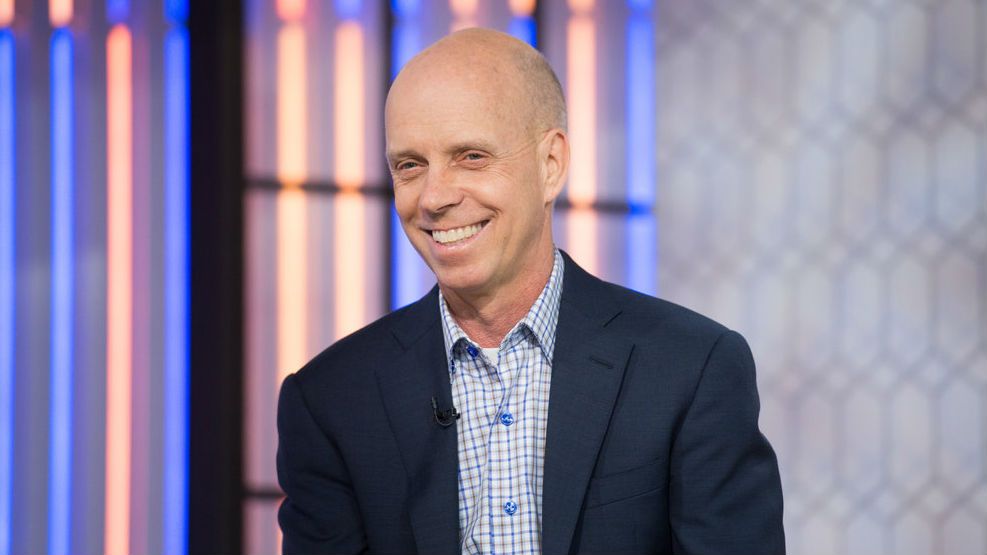Scott Hamilton knows what it takes to finish first. The American figure skater won a gold medal at the 1984 Winter Olympics, he’s been crowned a world champion in his sport four times, and he’s written a best-selling book, but it’s his latest written work that’s teaching others how to achieve their own dreams.
Finish First: Winning Changes Everything serves as the skater’s ode to competition. In the book, Hamilton discusses his own failures, his battle with cancer and brain tumors, and the invaluable life lessons he’s learned on and off the ice. For the Olympic champion, his new book is a way to share what he’s learned to help others reach their goals.
Guideposts.org spoke with Hamilton about the value of failure, his Olympic journey, his current battle with a brain tumor, and how faith plays a role in his success.
Your new book is all about the transformative power of winning, but failure plays a big role in that as well. What can people learn from failure?
The first thing we teach skaters when they come to the Scott Hamilton Skating Academy, no matter how old they are and no matter what their skill level, is how to fall and how to get up. Because they are going to fall—that’s inevitable—and we want to teach them how to respond. The same thing is true for all of us when it comes to failure. People think that winning is the opposite of failure, but that’s not true. Winning is actually the process of continually recovering from failures until our weaknesses become our greatest strengths. When we gain that perspective, we basically have a superpower because even failing makes us stronger.
You’ve faced plenty of adversity in your life, how do you think that’s shaped you as a competitor and as a human being?
Without dreams and aspirations, we may sleep through periods of incredible opportunity. I was put on a path that I needed to navigate in order to live the life that I could live. The Olympics are a dream and aspiration like no other. It has universal appeal where we celebrate life and excellence like no other movement in our world. I am now able to reach more people, touch their lives in impactful ways, and show people that anything is possible.
Why do you think this idea of competition and being “first” gets a bad rap these days?
Competition usually gets a bad rap because people have an unhealthy view of what it means to “win.” When we think of winning as knocking others down at any cost, then we can’t help but view our competitors as obstacles between us and success. But that’s an unhealthy approach. When we understand that “winning” is really about reaching our full potential, then we have a much healthier understanding of competition. In fact, we thrive on competition because we know that being around others who are working to reach their full potential—who are striving to be the best they can be—will push us to do the same.
Obviously a lot of finishing first in your own life has been in the rink, but how can people keep that mindset in other areas of their lives, even if they aren’t Olympians?
I think competition is a destination that gives us feedback to where we are in our sport, business, or classroom. It inspires everyone to be better, commit to the process, and understand who we are and what we need to be doing. We can sleep through our lives and deny our unique purpose and identities. Or we can roll up our sleeves, put in the time, and see how we can improve our lives and identities through the feedback we get from competing. It’s healthy, honest, and builds us to be who we are meant to be.
Your battle with cancer and brain tumors is inspiring to so many people suffering with the same kind of illnesses and issues. Where are you on your journey to recovery and how has your fight with cancer colored the way you view life?
I was born with this brain tumor that has come back for a third time. I just keep doing everything I can and the last 2 scans I’ve had show that it has shrunk. They just don’t do that. Truly, God gets all the glory. I must trust the “almighty Coach.” He can bring me home anytime. We are here by his grace and there’s something God wants me to do.
You battled illness as a child as well but skating was your outlet then. What can being on the ice do for kids? What does it have to teach them?
We tell our kids at the Scott Hamilton Skating Academy to never give up on anything. That’s why we teach them to fall. No matter how old, no matter what – you are going to fall and you have to get up. If you don’t fall it shows you played it safe skating. And this goes for anything, in life – if you didn’t fall, you didn’t try.
Beyond the medals and awards, what has skating given you?
I calculated once how many times I’ve fallen during my skating career – 41,600 times. But the funny thing is I got up 41,600 times! That’s the muscle you have to build, the one that tells you just get up. And through my life I have not only gotten up off the ice, but I’ve gotten up through my life. Like I said before, I am now able to reach more people, touch their lives in impactful ways, and show people that anything is possible.
You’ve been able to commentate on plenty of Olympic Games over the years, what’s the experience been like in South Korea?
There was a lot of logical apprehension as we go through our preparations to tell the powerful stories of the athletes and everything they have done to prepare for these Olympic Winter Games. Excitement and nervousness are felt by everyone here as we see the athletes, organizers, and broadcasters do their jobs as well as they can be done to perform in an event like no other.
Do you have a favorite moment from these Games?
I think all the skating was amazing. We saw so many firsts like Nathan Chen’s quad-filled free-skate, Marai Nigasu’s historic triple axel, bronze medals for Maia and Alex Shibutani and Team USA. But I was able to witness one of the best hockey games ever between the women of Team USA and Team Canada for the gold medal. Truly spectacular!
Do you see an end date in terms of hosting the Winter Olympics?
I love what I do and will do it for as long as NBC will have me.
What’s one thing you’d love for people to walk away with after reading your book?
The same qualities that go into preparing for an Olympics are the same ones we all need to use in order to live our lives fully and victoriously. Each and every one of us has a unique purpose and potential skill set that makes us special. It’s discovering that purpose and skill set that allows us to use Olympic aspirations to rise above our limitations and fears to live our lives fully. There are so many obstacles in our lives. Ones that seem to prevent us from being successful. To Finish First is to understand what you have to offer the world and then to be the best you can be at offering just that. To put your heart and soul into being the best you can be.
What motivates you to continue to fight against illness, to give back to those in need, and to keep skating?
God – I would say that I am a very blessed person of faith that is seeking to understand my ever changing purpose.




